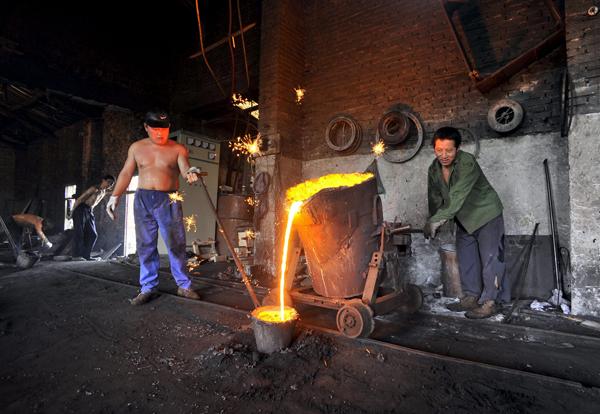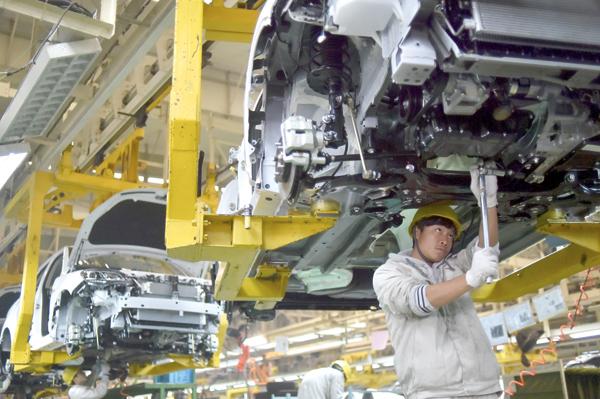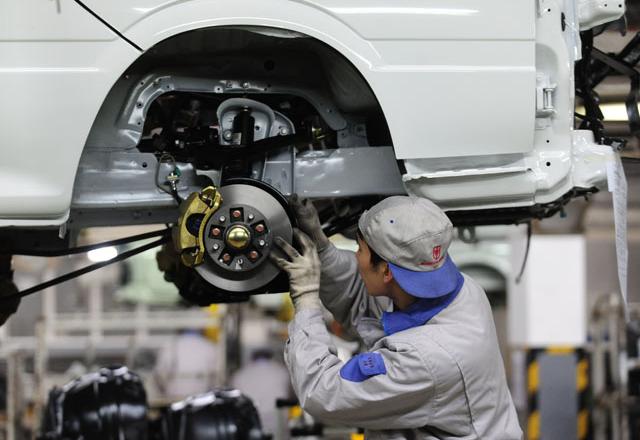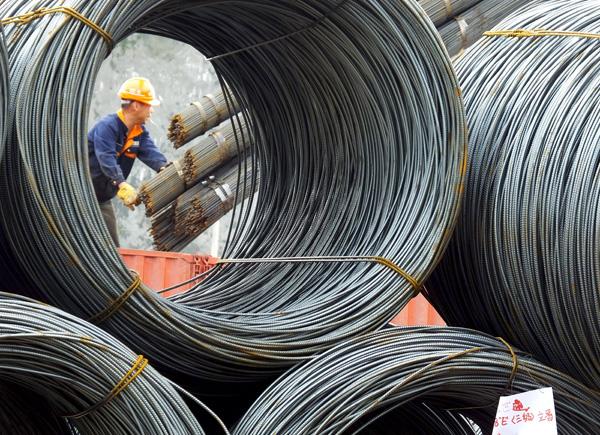You are here
China's industrial overcapacity damaging global economy
By Agencies - Feb 24,2016 - Last updated at Feb 24,2016

Labourers pour molten iron into a container at a foundry in Xiangfan, Hubei province, in this July 2, 2010 file photo (Reuters photo)
BEIJING — China's overcapacity in heavy industries is wreaking "far-reaching" damage on the global economy, with steel production "completely untethered" from market demand, the European Union Chamber of Commerce in China said this week.
The Asian giant's steel industry manufactures more than the next four largest producers combined — Japan, India, the US, and Russia — the chamber indicated in a report, warning that more than 60 per cent of China's aluminium industry has negative cash flow.
And in just two years, its cement production equalled the amount produced in the United States during the entire 20th Century.
"China has not followed through on the attempts it has made over the last decade to address overcapacity," chamber president Joerg Wuttke said in a statement.
Brussels has launched new anti-dumping probes into Chinese steel imports, as producers in both Europe and Asia struggle with global prices that have plummeted in the face of oversupply.
"Overcapacity has been a blight on China's industrial landscape for many years now, affecting dozens of industries and wreaking far-reaching damage on the global economy in general, and China's economic growth in particular," the chamber's report said.
The issue has led to trade tensions between the world's second-largest economy and developed countries that accuse it of dumping in their markets.
China accounts for half of global steel production but internal demand has slowed sharply along with economic growth, forcing it to look overseas. Its steel exports soared 20 per cent in 2015, according to Chinese Customs data.
The European Union (EU) launched probes this month into imports of Chinese steel, with trade commissioner Cecilia Malmstroem warning: "We cannot allow unfair competition from artificially cheap imports to threaten our industry."
This month, Luxembourg-based world leader in steelmaking ArcelorMittal blamed China for a colossal $8 billion loss in 2015, at a time when thousands of jobs are being cut across the industry.
But many Chinese steel firms are also losing money, and Beijing has announced plans to cut production by as much as 150 million tonnes over the next five years.
Protectionism
Despite authorities' vows to tackle excess production, the EU chamber report said Beijing's prioritisation of industrial policies over consumption meant "the Chinese government's current role in the economy is part of the problem".
To achieve change, it added that the government needed "a willingness to change itself".
Wuttke told reporters: "We are now in a far more worse position than we were before."
"Beijing increasingly has the same problems as Brussels: making things happen. That was not the case 10 or 15 years ago. Local protectionism is very strong," he said.
Beijing hopes to soak up overcapacity by selling its excess production to markets in Central Asia and the Middle East as part of President Xi Jinping's One Belt One Road plan, which has been touted as a revival of ancient Silk Road trade routes.
But those markets were not big enough to absorb China's overcapacity, Wuttke remarked.
It "is a complete mismatch, it will not put even a minor dent in the overcapacities in China", he said.
With traditional heavy industries facing persistent weakness, foreign investors favoured the more robust services sector and higher-value, hi-tech manufacturing last year, data from commerce ministry showed recently.
China attracted $126.3 billion, or 781.4 billion yuan, in non-financial foreign direct investment (FDI) in 2015, up 6.4 per cent from 2014, despite its cooling economy.
The services sector has utilised $77.2 billion, or 477.1 billion yuan of foreign investment, up 17.3 per cent from 2014.
United States ride-hailing firm Uber has committed to invest 6.3 billion yuan ($956.33 million) in China as it aims to break into its huge tourism industry with businesses ranging from transportation services to automotive financing.
The world's largest coffee chain, Starbucks Corp., said it aims to open 500 stores in China this year, its largest market outside of the US, and aims to create 10,000 jobs in China every year through 2019.
At present, investment from overseas companies contributes to half of all foreign trade in China, one-quarter of industrial output, one-seventh of urban employment and one-fifth of tax income, the ministry statement indicated.
While FDI is a key measure of general overseas investment interest in China, it is a small factor within overall capital flows and when compared to the huge export sector.
According to Reuters calculations, China attracted $12.23 billion, or 77.02 billion yuan, in non-financial FDI in December.
High-tech manufacturing accounted for $9.41 billion, or 58.35 billion yuan, of foreign direct investment in 2015, up 9.5 per cent from 2014 and accounting for 23.8 per cent of investment in China's manufacturing sector, according to the commerce ministry's statement.
Almost no FDI was approved for industries suffering from overcapacity such as steel, cement and ship-building, the statement said.
Free trade zones in Guangdong, Tianjin and Fujian attracted investment of 445.81 billion yuan from 6,040 overseas companies between January and November 2015, according to the statement.
The government has encouraged firms recently to expand investment abroad to gain global competitiveness.
Related Articles
BEIJING — China's economic slowdown is hitting profits at more foreign companies, a survey by an American business lobby showed, while the v
China's trade surplus soared by almost half last year to a record $382 billion, the government announced Tuesday, but the world's second-largest economy again missed its trade growth target due to weakness overseas.
BRUSSELS/BEIJING — China and other major steel-producing countries failed to agree measures to tackle a global steel crisis as the sides arg



















